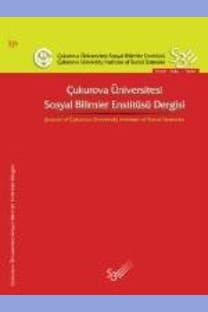Enformasyon Elde Etme Ve Yaymanın Jenerik Stratejiler itibariyle Faklılaşması: Konaklama işletmeleri Üzerine Ampirik Bir Araştırma
Enformasyon Elde Etme, Strateji, Konaklama İşletmeleri, Türkiye
Enformasyon Elde Etme Ve Yaymanın Jenerik Stratejiler itibariyle Faklılaşması: Konaklama işletmeleri Üzerine Ampirik Bir Araştırma
___
- Aksu, A. ve Özdemir, B. (2005). Individual learning and organizational culture in learning organizations: Five star hotels in Antalya Region of Turkey”, Managerial Auditing Journal, 20 (4):422-441.
- Altunışık, R., Coşkun, R., Yıldırım, E. ve Bayraktaroğlu, S. (2002). Sosyal Bilimlerde Araştırma Yöntemleri: SPSS Uygulamalı. 2. Basım, Sakarya: Sakarya Kitabevi.
- Bahar, O. ve Kozak, M. (2005). Küreselleşme Sürecinde Uluslararası Turizm ve Rekabet Edebilirlik. Ankara: Detay Yayıncılık.
- Berthon, P., Pitt, L. F. ve Ewing, M.T. (2001). Corollaries of the collective: The influence of organizational culture and memory development on perceived decision-making context, Journal of Academy of Marketing Science, 29 (2): 135-150.
- Bowen, J. T. (1997). A market-driven approach to business development and service improvement in the hospitality industry, International Journal of Contemporary Hospitality Management, 9 (7): 334-344.
- Fiol, C. M. ve Lyles, M.A. (1985). Organizational learning, Academy of Management Review, 10 (4): 803-813.
- Hlavacka S., Bacharova, L., Rusnakova, V. ve Wagner, R. (2001). Performance implications of Porters’ generic strategies in Slovak hospitals, Journal of Management in Medicine, 15 (1):44-66.
- Huber, G. P. (1991). Organizational learning: The contributing processes and the literatures, Organization Science, 2 (1): 88-115.
- Jaworski, B. J. ve Kohli, A.K. (1993). Market orientation: Antecedents and consequences, Journal of Marketing, 57 (3): 53-70.
- Keats, B. W. ve Hitt, M.A. (1988). A causal model of linkages among environmental dimensions, macro organizational characteristics, and performance, Academy of Management Journal, 31 (3): 570-596.
- Kim, E., Nam, D. ve Stimpert, J.L. (2004), Testing the applicability of Porter’s generic strategies in the digital age: A study of Korean cyber malls, Journal of Business Strategies, 21 (1): 19-45.
- Kotler, P., Bowen, J.T. ve Makens, J.C. (2006), Marketing for Hospitality and Tourism. Pearon International Edition.
- Lazer, W. ve Layton, R.A. (1999). Contemporary Hospitality Marketing: A Service Management Approach. Educational Institute of The American Hotel&Motel Association.
- Li, T. ve Cavusgil, T. (1999). Measuring the dimensions of market knowledge competence, European Journal of Innovation Management, 2 (3): 129-145.
- Moorman, C. (1995). Organizational market information processes: Cultural antecedents and new product outcomes, Journal of Marketing Research, 32 (3): 318-335.
- Morgan, R. E. ve Turnell, C. R. (2003). Market-based organizational learning and market performance gains, British Journal of Management, 14 (3): 255-274.
- Olsen, M., West, J. ve Tse, E.C. (1998). Strategic Management in The Hospitality Industry. 2nd Edition, John Wiley & Sons, Inc.
- Porter, M. E. (2000). Rekabet Stratejisi: Sektör ve Rakip Analizi Teknikleri [Competitive Strategy: The Techniques for Industry and Rival Analysis]. Çeviren. Gülen Ulubilgen, Sistem Yayıncılık.
- Resmi Gazete (2005, 21 Haziran). Turizm Tesislerinin Belgelendirilmesine ve Niteliklerine İlişkin Yönetmelik, Karar Sayısı:2005/8948, Resmi Gazete Sayı: 25852.
- Rubach, M.J. ve McGee, J.M. (1998). Stuck in the middle: For retailers, perhaps not such a bed place to be, Proceedings of Association of Small Business & Entrepreneurship, ss. 29-34, http://sbaer.uca.edu/research/asbe/1998/pdf/06.pdf, Erişim: 05 Ekim 09.
- Sinkula, J. M., Baker, W.E. ve Noordewier, T. (1997). A framework for market-based organizational learning: Linking values, knowledge, and behavior, Journal of The Acedemy of Marketing Science, 25 (4): 305-318.
- T.C. Kültür ve Turizm Bakanlığı (2008). Turizm Belgeli Tesis İstatistikleri 2007. Yatırım ve İşletmeler Genel Müdürlüğü Araştırma ve Değerlendirme Dairesi Başkanlığı Yayını, http://www.kultur.gov.tr/TR/BelgeGoster.aspx?F6E10F8892433CFF4497A73B597516EA85E8A FC7A1B9BEFB.
- Teare, R. ve Bowen, J.T. (1997). Assessing information needs and external change, International Journal of Contemporary Hospitality Management, 9 (7): 274-284.
- Teare, R. ve O’Hern, J. (2000). Challenges for service leaders: Setting the agenda for the virtual learning organization, International Journal of Contemporary Hospitality Management, 12 (2): 97-106.
- Thomas, J.B. ve McDaniel, R. (1990). Interpreting strategic issues: Effects of strategy and the information-processing structure of top management teams, Academy of Management Journal, 33 (2): 286-306.
- Xiao, H. (2006). Towars a research agenda for knowledge management in tourism, Tourism and Hospitality Planning & Development, 3 (2): 143-157.
- Yang, J. (2004). Qualitative knowledge capturing and organizational leaning: Two case studies in Taiwan hotels, Tourism Management, 25 (4): 421-428.
- Zahay, D. ve Griffin, A. (2004). Customer learning processes, strategy selection and performance in business- to-business service firms, Decision Science, 35 (2): 169-203.
- Zahra, S. ve Covin, J. (1993). Business strategy, technology policy, and firm performance, Strategic Management Journal, 14 (6): 451-478.
- ISSN: 1304-8880
- Yayın Aralığı: Yılda 2 Sayı
- Başlangıç: 2013
- Yayıncı: Çukurova Üniversitesi Sosyal Bilimler Enstitüsü Dergisi
Yrd. Doç. Dr. Oğuz TÜRKAY, Prof. Dr. İge PIRNAR
Sanat Hayata Nasıl Bakar? Antony Gormley’in Eserleri Üzerinden Bir Açıklama
CHILDREN'S CLASSIFICATION OF GEOMETRIC SHAPES
Prof. Dr. Yaşare Aktaş ARNAS, Arş. Gör. Durmuş ASLAN
BİR POPÜLER KÜLTÜR İKONU OLARAK JAMES BOND FİLMLERİNİN İDEOLOJİK OKUMASI
Uzm. Eylem ARSLAN, Yrd. Doç.dr. Aynur KÖSE
Marka Değerinin Marka Genişlemesine Etkisi
Yrd.doç.dr.şakir ERDEM, H.neylan USLU
TÜRKİYE EKONOMİSİNDE İÇ BORÇLANMANIN YERİ VE SÜRDÜRÜLEBİLİRLİLİĞİ
Doç.Dr. Harun BAL, Arş. Gör. Pınar Özdemir, Pınar ÖZDEMİR
MÜŞTERİ BEKLENTİLERİ İLE MÜŞTERİ SADAKATİ ARASINDAKİ İLİŞKİ: BEŞ YILDIZLI BİR OTEL ÖRNEĞİ
Doç.dr. Kahraman ÇATI, Öğr.gör.cenk Murat KOÇOĞLU, Arş.gör.levent GELİBOLU
Satıcıların Kişilikleri ile Performanslarının ilişkisi; Beş Faktör Modeline Göre Bir Analiz
Doç.dr.canan MADRAN, Tahsin AKDOĞAN
AS A NEW COST AND PERFORMANCE MANAGEMENT TOOL: ECONOMIC VALUE ADDED (EVA)
ilköğretim ikinci Kademe Sosyal Bilgiler Öğretmenlerinin Eleştirel Düşünme Becerilerinin incelenmesi
